MoT: Q&A on test suspensions in Northern Ireland
- Published
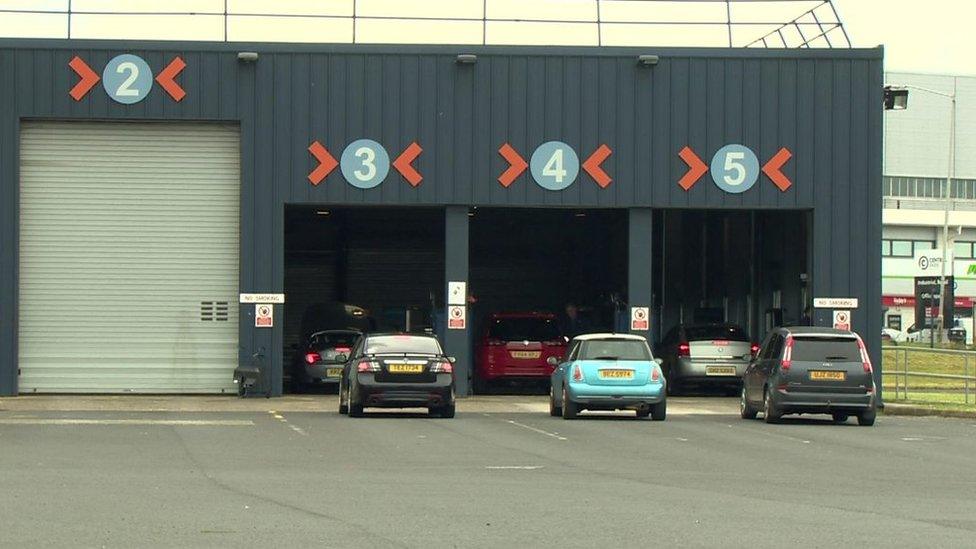
Most MoT tests for cars and light vehicles have been suspended
The vast majority of MoT tests in Northern Ireland have been suspended indefinitely due to safety concerns about equipment used during the tests.
BBC News NI looks at the background to the situation and how it is affecting thousands of motorists.
Why have MoT tests been suspended?
Tests are suspended because cracks have been found in most vehicle lifts in Northern Ireland's 15 MoT centres.
The equipment is used by staff to examine underneath cars and vans.
During a recent in-depth inspection of all testing centres, signs of cracking were identified in 48 out of the 55 lifts in operation.
The Driver and Vehicle Agency (DVA) asked the firm which supplied the lifts to carry out repairs, but an insurance inspector was not satisfied with the attempt to fix them.
As a result, most MoT tests for cars and other light vehicles in Northern Ireland were suspended with immediate effect on Monday 27 January.
Have all MoT tests been cancelled?
No - the suspension only applies to cars and light vehicles such as vans.
MoT tests for heavy goods vehicles, motorcycles and buses are continuing as normal.
Does this affect all vehicle test centres?
Yes, the suspension applies to all 15 MoT centres in Northern Ireland.
My test is already booked and due to take place shortly - what do I do?
Customers who have a current MoT test appointment for a car or light vehicle have been told not to attend as their test will not be carried out.
Thousands of tests have already been cancelled and there is no confirmation as yet on when testing will resume.
Customers whose test is due to take place over the next few weeks are being advised to keep an eye on the nidirect website, external for further information.
How long is the MoT suspension going to last?
The DVA has said it could take weeks, or possibly months, to resolve the situation if the defective lifts have to be replaced.
Its chief executive, Paul Duffy, said the agency was looking at a number of options, including repair and replacement.
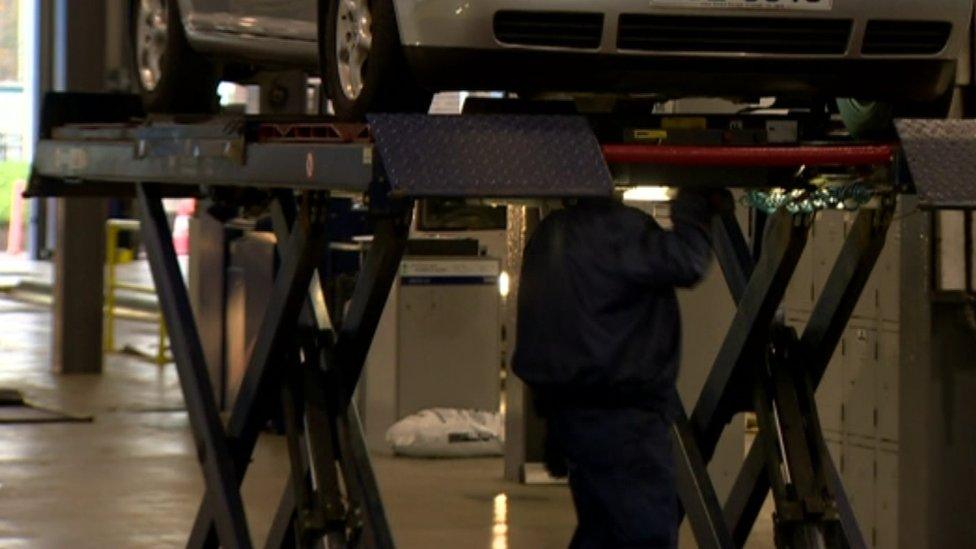
Scissor lifts are used in MOT centres to inspect underneath vehicles
My MoT certificate is due to expire - can I drive my vehicle without a new test?
That depends on what you drive - if your car or light vehicle is five years old, or more, it will be eligible for a temporary exemption certificate, external.
These exemptions will extend a vehicle's MoT certificate by four months.
The certificates will be issued automatically to drivers whose MoT appointment has been cancelled by the DVA.
It may take up to 10 days for the certificate to arrive in the post, but it is legally valid from the moment your test is cancelled.
However, these exemptions will not be issued for four-year-old cars or taxis.
Why are four-year-old cars being excluded from the exemptions?
Four-year-old cars have never been through an MoT test before, meaning they do not have an MoT test certificate to extend.
These vehicles, along with taxis, will be prioritised for tests which will be carried out in the heavy vehicle lanes in MoT test centres.
These lanes use pits rather than vehicle lifts so are not affected by the same safety concerns.
"These lanes have already been used to test cars in previous years due to the volume of bookings," said Julie Thompson, deputy secretary at the Department for Infrastructure.
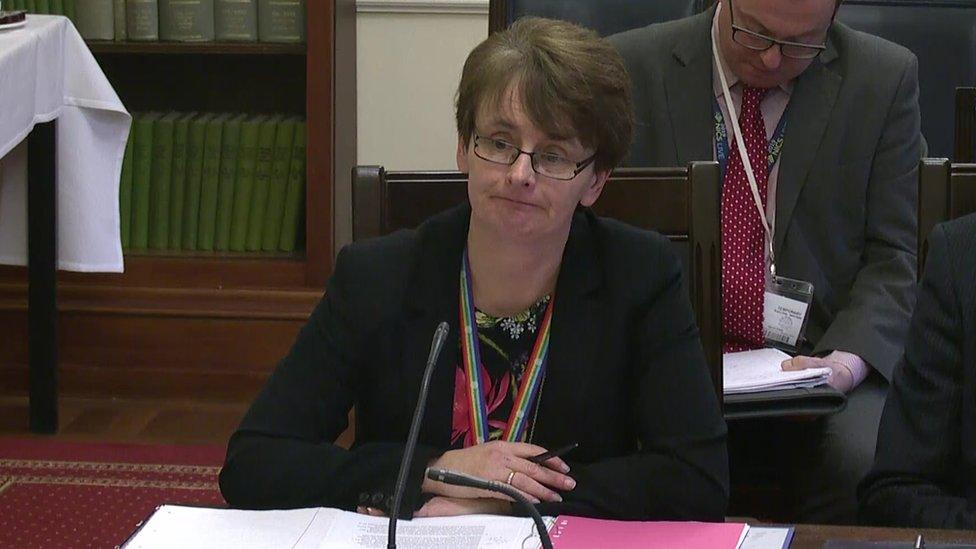
Julie Thompson is responsible for the DVA and the department’s planning functions
Why are taxis being excluded from the exemptions?
Taxis require a higher level of safety checks because they provide a service to the public, as opposed to private vehicles.
Taxis are covered by different legislation and are subject to a PSV [Public Service Vehicle] test.
Am I insured to drive if I do not have an up-to-date MoT certificate?
The Association of British Insurers (ABI) told BBC News NI that insurance providers "will generally take a pragmatic view and not penalise policyholders for something that is entirely out of their control".
"We understand this is will be a concerning time for drivers who are affected," said Alistair Ross, ABI's head of public policy for Scotland, Wales and Northern Ireland.
"If your car is due a MOT, make sure to get an exemption certificate from the Driver and Vehicle Agency."
Mr Ross added: "Driver safety is paramount, so in the meantime drivers should carry out basic vehicle checks such as checking tyre pressure and ensuring windscreen liquid and oil are at the correct levels."
If I get an exemption, who is responsible for ensuring my car is roadworthy during the four-month extension?
"It's your responsibility as a vehicle owner to ensure your car is roadworthy at all times," said DVA chief executive Paul Duffy.
He pointed out that having a valid MoT test certificate does not necessarily mean that a vehicle is free from dangerous mechanical defects, because the test is only carried out once a year.
"In six months' time [after passing an MoT test] your car could have those faults," Mr Duffy said, adding defects could develop at any time after an inspection.
"You should always ensure your vehicle is roadworthy - it is your responsibility as a road user," he added.
Can MoT test appointments still be booked during the suspension?
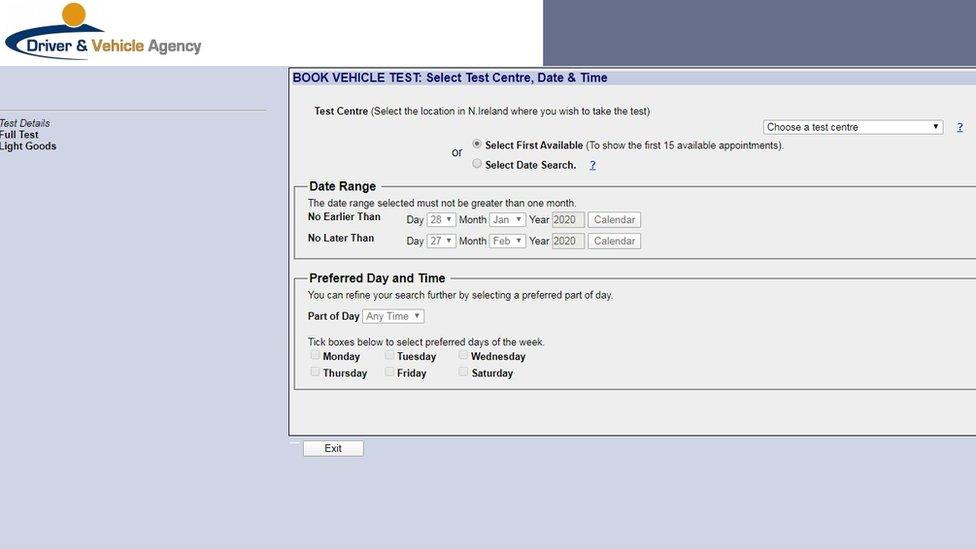
The DVA is still taking bookings for MoT tests online, by phone and in person
Yes, and drivers are advised to book an appointment as soon as they get a reminder letter.
Temporary exemption certificates cannot be issued unless your MoT test had been cancelled by the DVA.
"You need to have booked your car in for a test and have that test cancelled by the DVA for us to pick it up from our systems," said Ms Thompson, from the Department for Infrastructure.
She said once the test was cancelled, a four-month exemption would be issued which was "legal from the minute that it changes on our back office system".
Can I tax my car if my MoT test has been cancelled?
Yes, as long as your vehicle is eligible for a four-month temporary exemption certificate (see above).
This will be automatically issued when the DVA cancels your test on its system.
Ms Thompson, from the Department for Infrastructure, said: "Overnight, the tax on your car will be linked to that four-month extension, meaning you can still tax your car."
On Wednesday, the Police Service of Northern Ireland said they will show discretion in regards to cars that are untaxed because drivers cannot get MoT tests.
They added that as long as the vehicle is roadworthy it is unlikely to be referred for prosecution.
What happens if my car failed its test and is due for retest - I assume I will not get an extension?
Current DVA advice is that if your vehicle fails an MOT test it is immediately "treated as not being roadworthy and it should not be on the road, external".
In those circumstances there is no valid MoT certificate to extend, similar to the case of four-year-old cars which do not qualify for exemptions as they have never been tested.
When were the cracks in the vehicle lifts first noticed?
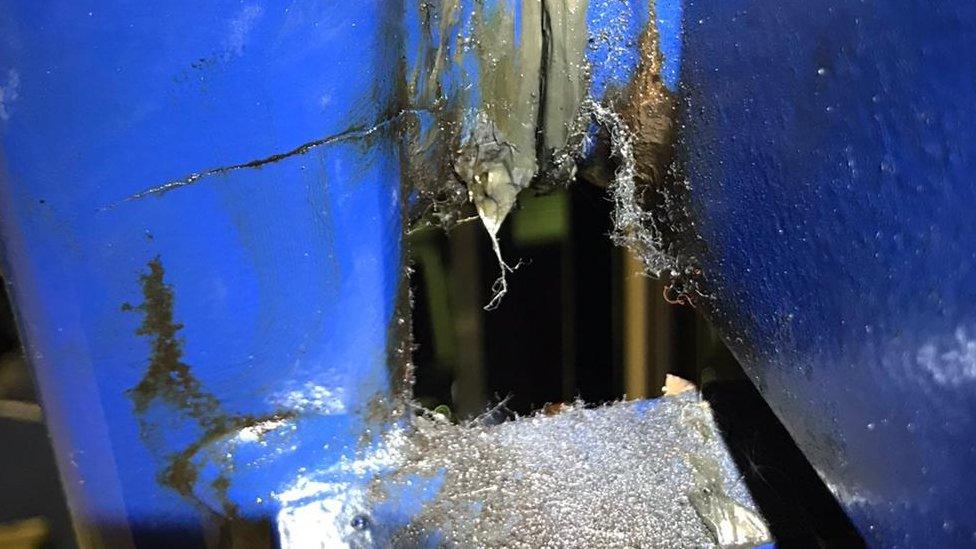
The BBC obtained a picture of a crack in a lift at one of the vehicle test centres in Northern Ireland
Signs of cracking on MoT lifts were first discovered in November 2019 during a routine inspection of Larne MoT centre in County Antrim.
It was detected by the firm which supplies the lifts, and which is responsible for the regular examination and maintenance of the equipment.
The same firm then began an in-depth inspection of all vehicle lifts in operation across Northern Ireland's 15 MoT centres.
On 15 January, it reported the results to the DVA, having identified signs of cracking on 48 out of the 55 lifts.
How often were the lifts inspected before the problem was discovered?
The majority of the vehicle lifts were installed in 2011/12 and the supplier of the equipment was responsible for routine inspection and maintenance, according to the DVA.
Routine checks were carried out every eight weeks and a more in-depth test was carried out every six months.
How much is it going to cost the public purse?
The total cost is not yet clear as DVA management is not sure if the lifts can be repaired to a safe standard or if they will have to be replaced.
If all 55 vehicle lifts have to been replaced, new lifts could cost between £30,000 and £40,000 each according DVA chief executive Paul Duffy.
Using his estimate, the total bill could range from £1.65m to £2.2m.
There is also the cost of compensating motorists affected by the cancellations.
Before the widespread suspension was announced on Monday, about 7,000 MoT tests had been cancelled.
Infrastructure Minister Nichola Mallon said those motorists would receive a refund of half their £30.50 MoT test fee and would be offered a rescheduled test at no additional charge.
Ms Thompson, from the department, said her agency had enough funds to cover the bill and would not need to seek additional money from the public purse.
Why can't MoTs be carried out in privately-owned garages?
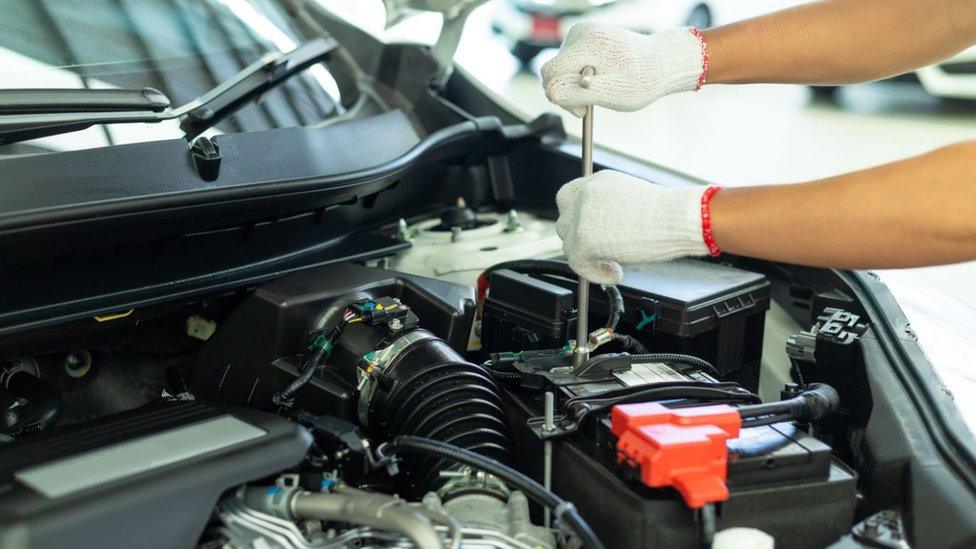
Approved, private-owned garages can carry out MoT inspections in England, Scotland and Wales
The MoT testing process in Northern Ireland is different from the system operating in Great Britain.
In England, Scotland and Wales, vehicles can be tested in thousands of approved MoT test stations, external, which are usually privately-owned car mechanic firms.
In Northern Ireland, vehicle tests can only take place in dedicated, publicly-owned MoT centres, of which there are 15.
DVA chief executive, Paul Duffy, was asked by BBC Radio Ulster if private garages could be used to clear the MoT test backlog that is currently building up across Northern Ireland.
He simply replied: "What I would say about the model that's used in GB - if you look across Europe, there are very, very few countries that use the GB model."
The Republic of Ireland also has a network of dedicated National Car Test centres, external, as opposed to private firms.
- Published28 January 2020
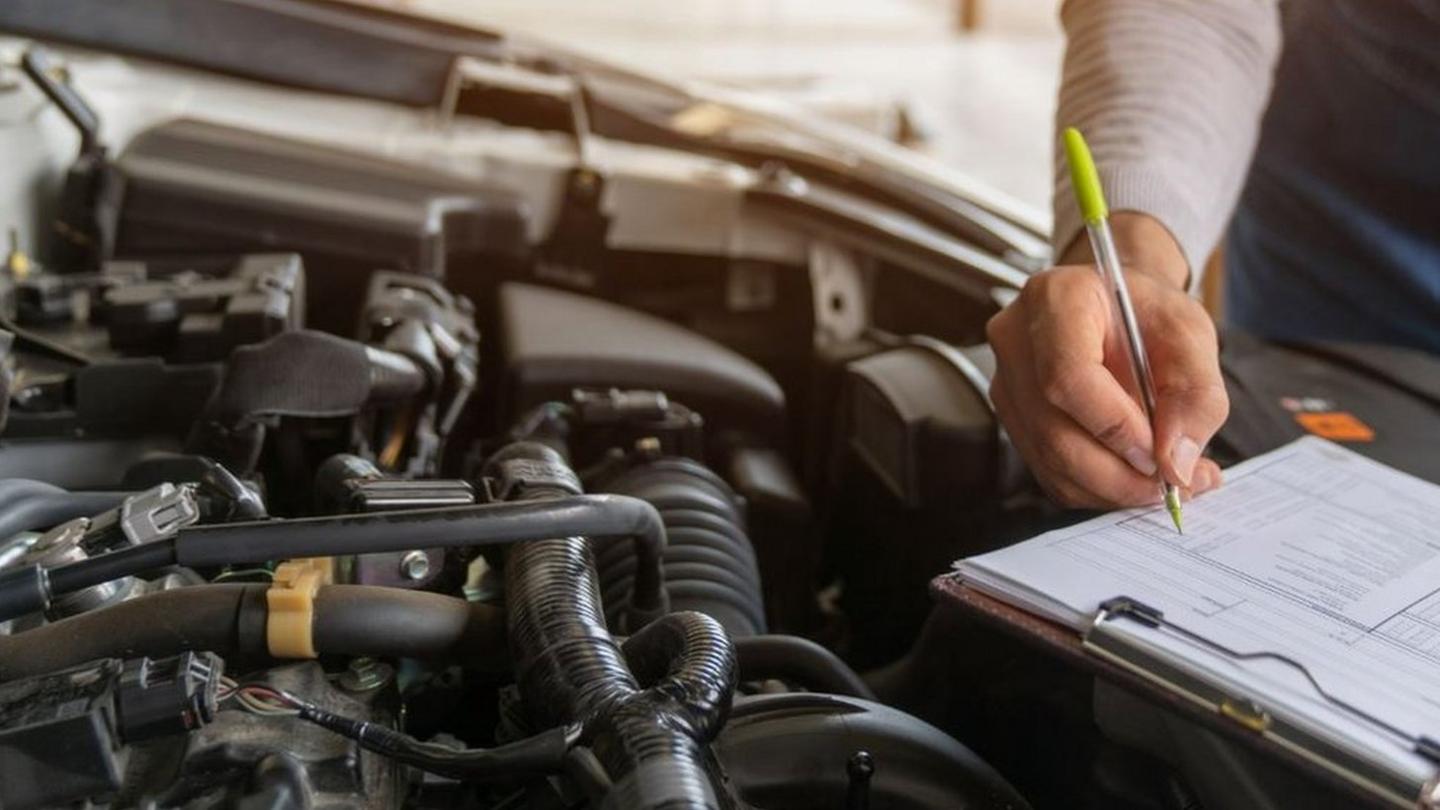
- Published23 January 2020
